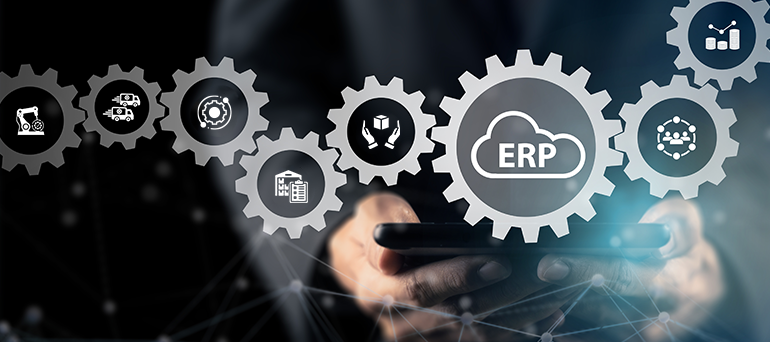Cloud ERP software gives companies access to their mission-critical operations at any time, from any location – and provides infinite abilities to scale and innovate.
It is helping process manufacturing industries such as food, life sciences, pharmaceuticals, nutraceuticals, and other sectors to cater to diverse requirements and streamline all operations efficiently.
Challenges Faced When Employing an On-Premise ERP
In today’s competitive atmosphere, companies that do not use a cloud-based ERP system may face several challenges that can impact the overall operations, efficiency, and competitiveness. Some of the major challenges among these include:
1. Limited Accessibility and Collaboration
Accessing critical business data and functions remotely is crucial, especially in a globalized business environment where teams and partners may spread across multiple locations. The traditional form of ERP systems lacks modern communication and collaboration methods like virtual desktops, remote access to any data and information, and more. It makes it harder for teams to work together efficiently and share information across departments.
2. Scalability Constraints
Old versions of ERP systems may require significant hardware and software upgrades to scale with business growth. It remains a time-consuming and costly process, slowing down expansion efforts.
3. Integration Challenges
Integrating on-premises ERP systems with other business applications and tools, such as CRM or e-commerce platforms, becomes difficult. It even becomes expensive to manage this kind of integration when taken inefficiently. Moving to the cloud provides you with integration capabilities that enable seamless data exchange and collaboration between the ERP system and other software applications used in this organization. It includes built-in APIs and connectors for seamless integration.
Benefits of Cloud ERP
1. Lowered Capital Expenditure
Process manufacturing often requires specialized equipment and facilities, which can be capital-intensive. Cloud ERP for manufacturing reduces the need to invest in expensive on-site IT infrastructure. Companies can also allocate their capital to improving production processes like acquiring essential machinery or expanding their product lines.
2. Upfront Infrastructure and Lowered Operating Expenses
Cloud ERP minimizes the need for maintaining on-premises servers and associated hardware, resulting in lower operating costs. It also allows process manufacturers to allocate resources to areas like quality control, research and development, and compliance.
3. Increased Agility
The manufacturing industry is often subject to fluctuations in demand, and changes in regulatory requirements. Cloud ERP systems provide the agility needed to scale operations up or down in response to market shifts. This ensures that process manufacturers can rapidly adjust production levels and product lines, helping them stay competitive.
4. Improved Availability and Reliability
Unplanned downtime can be costly in process manufacturing, a cloud ERP solution is typically hosted in data centers with robust infrastructure and redundancy, ensuring high availability and reliability. It helps in reducing the risk of production interruptions and ensures consistent product quality.
5. Regular Updates
Regulations and industry standards are continually evolving in process manufacturing, particularly in areas like food and pharmaceuticals. Cloud ERP providers frequently update their software to comply with these changing requirements. Process manufacturers benefit from having access to the latest features, security patches, and compliance enhancements without the need for manual software updates.
Security and Compliance
Security and compliance are paramount in process manufacturing, where data integrity and product quality are critical. Cloud manufacturing ERP providers invest heavily in robust security measures and often have compliance certifications tailored to industries like food, pharmaceuticals, and chemicals. It also helps in ensuring sensitive data protection and regulatory requirements are met, reducing the risk of costly breaches and fines.

Types of Cloud ERP
There are two deployment models for cloud-based ERP systems, i.e., single-tenant and multiple-tenant systems. These models differ in how they manage infrastructure, data, and access. Let us discuss how they differ from each other and their relevance in the context of process manufacturing.
Advantages of a Single Tenant Cloud ERP System Deployment
In a single-tenant cloud deployment, each customer or organization has its dedicated instance of the ERP application and database running on the cloud infrastructure.
Data Isolation
Process manufacturing companies involve high data integrity and compliance with industry-specific regulations. BatchMaster with its single-tenant cloud ERP system provides a high level of data isolation security and control over data access.
Customization
With an efficient single-tenant cloud ERP system, process manufacturing companies get greater customization and flexibility as it provides personalized instances that can be tailored to the specific needs of the organization. It allows convenient and easier production processes.
Scalability
With each instance isolated, BatchMaster provides the opportunity to scale the resources up or down as needed without affecting other tenants. This becomes helpful in adapting to fluctuating production demands in life sciences, pharmaceuticals, and other process manufacturing segments.
Advantages of a Multi-Tenant Cloud ERP System Deployment
In a multi-tenant cloud deployment, multiple companies share the same ERP application and database instance, but their data is logically separated and secured. It involves separate secure login tenants to access the system.
Cost Efficiency
Multi-tenant systems are efficient for process manufacturing companies and are a cost-effective solution, as they provide infrastructure resources shared among multiple organizations. This is more helpful for smaller or mid-sized process manufacturing companies with budget constraints.
Ease of Maintenance
Using multi-tenant cloud ERP, it is easier to maintain updates because changes are applied once to the shared instance. It can reduce the IT maintenance burden and ensure that the system is always up to date.
Quick Deployment
It often offers quicker deployment times since infrastructure is pre-configured and shared. This can be advantageous when rapid implementation is required.
Discover how BatchMaster Cloud Solutions Can Benefit Your Organization
Next Steps
Transitioning to a cloud ERP system offers companies the flexibility, scalability, accessibility, and security they need while reducing the upfront capital investment and ongoing IT expenses.
To learn more about the capabilities of the BatchMaster cloud ERP solution, contact us today !



